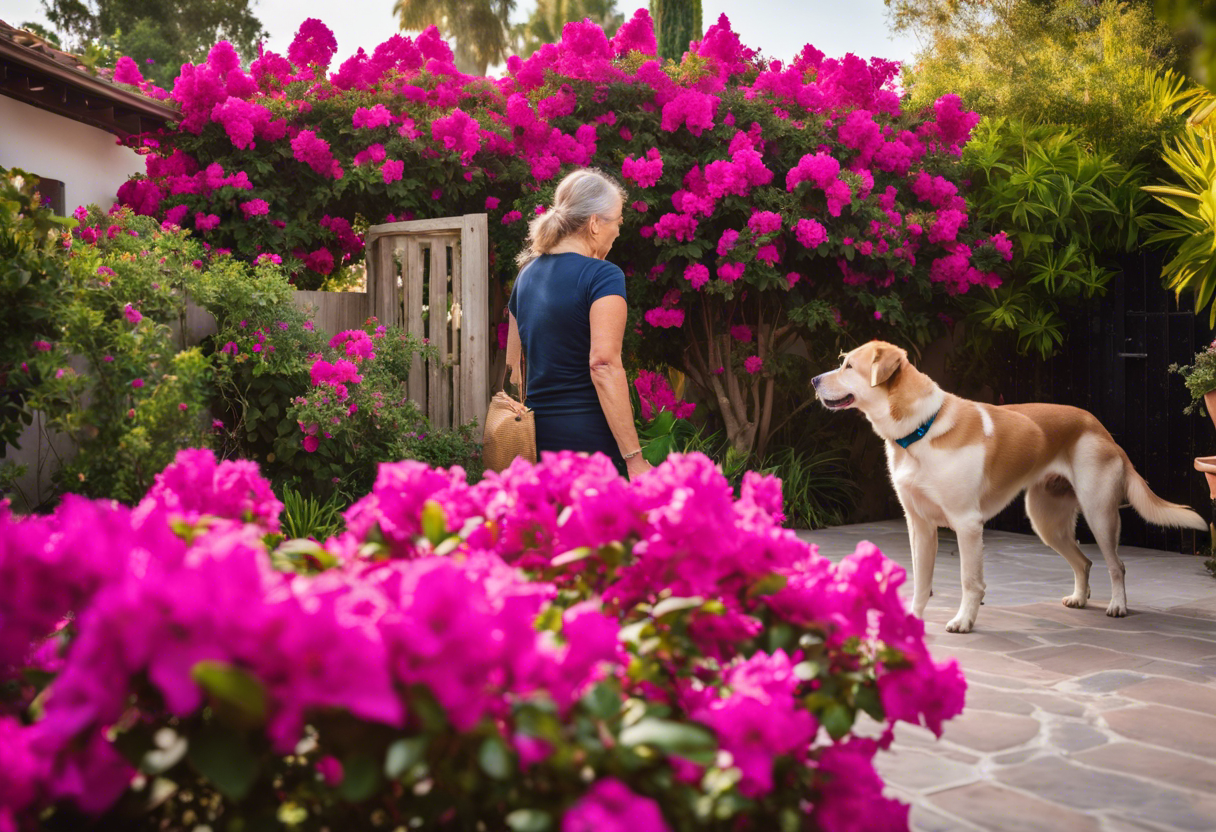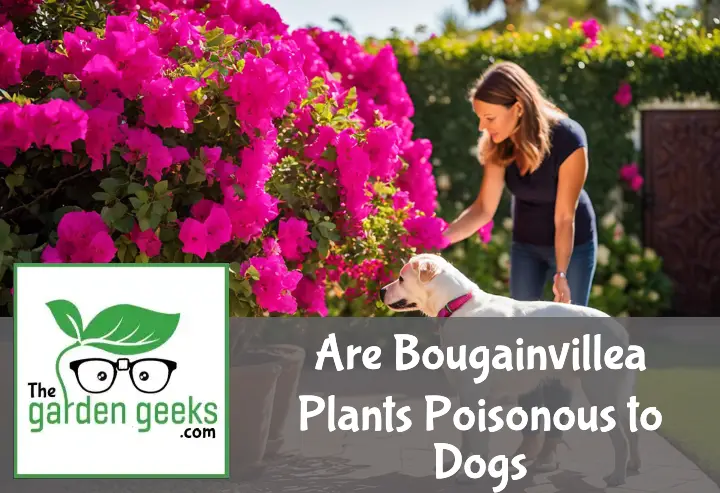Ever found yourself admiring the vibrant hues of a Bougainvillea plant in your garden, only to suddenly wonder, Are Bougainvillea Plants Poisonous to Dogs? Well, I’ve been in those shoes too, trust me! Bougainvilleas are indeed a sight for sore eyes but they might also be a bit of a pickle for our furry friends.
In this post, we’ll delve into the nitty-gritty about these beautiful yet potentially problematic plants. So buckle up and keep reading about ‘Are Bougainvillea Plants Poisonous to Dogs?’
Key Takeaways
- Bougainvillea plants are indeed poisonous to dogs.
- They contain toxic compounds like saponins, which can cause vomiting, diarrhea, and other symptoms if ingested by dogs.
- The plant’s sharp thorns can also cause physical injuries to dogs.
- Immediate veterinary attention is required if a dog ingests bougainvillea or shows signs of poisoning.
- Preventative measures include keeping these plants out of reach or removing them from areas where dogs have access.
What are Bougainvillea Plants?
Bougainvillea plants, oh boy, where do we start? These beauties are like the supermodels of the plant world. They’re all about the Importance of Bougainvillea in adding color and vibrancy to any garden. With their stunning flowers and lush foliage, they’re a sight for sore eyes. But there’s more to these plants than meets the eye. Let’s dive into understanding Bougainvillea plant characteristics.
Origin and Description of Bougainvillea Plants
These stunners originally hail from South America. Yes, you heard it right! The Origin of Bougainvillea is as exotic as they come. Now let’s talk about their looks – trust me, it’s worth discussing.
The first thing that strikes you about these plants is their vibrant colors. Their flowers aren’t actually flowers but bracts – modified leaves that come in all shades of pink, purple, red, orange…you name it! The actual flowers are tiny white things hidden inside these bracts.
Next up: their leaves. They’re dark green and heart-shaped – a perfect backdrop for those colorful bracts. And then there’s the thorny vine-like structure that gives them a wild yet elegant look.
Common Varieties of Bougainvillea Plants
Now onto some popular types or should I say stars? First up is ‘Barbara Karst’. She’s a classic with her bright red bracts that can light up any space.
Then we have ‘California Gold’ – not as flashy as Barbara but equally charming with her golden-yellow bracts. She’s definitely one for those who prefer subtle elegance over bold flamboyance.
And lastly, meet ‘Purple Queen’. As her name suggests, she reigns supreme with her royal purple bracts that can make any garden look regal.
So there you have it, a quick rundown on common varieties of Bougainvillea. Each one unique, each one beautiful. But the question remains – Are Bougainvillea Plants Poisonous to Dogs? Well, let’s find out in the next section.
Are Bougainvillea Plants Poisonous to Dogs?

Let’s cut to the chase: Are Bougainvillea Plants Poisonous to Dogs? Yes, they can be. It’s all about the bougainvillea toxicity. Like many garden plants, bougainvilleas have components that could spell trouble for our furry friends.
Understanding Plant Toxicity in Dogs
So what makes a plant toxic to dogs? Well, it’s not like they’re munching on kryptonite or anything. Certain plants contain chemicals that just don’t sit well with a dog’s system. They can cause a range of symptoms, from mild discomfort to serious health issues.
Now, when we talk about dog plant poisoning, we’re looking at signs like vomiting, diarrhea, and lethargy. More severe cases might involve seizures or even coma. So if Fido suddenly starts acting weird after a garden adventure, it might be time for a vet visit.
Specific Toxic Components in Bougainvillea Plants
Alright, so what’s the deal with bougainvilleas specifically? Well, these vibrant beauties harbor some sneaky dangers for dogs. The main culprits are certain compounds found in their sap.
When your dog comes into contact with this sap – say by chewing on the stems or leaves – it can lead to skin irritation or gastrointestinal upset. That means you might end up dealing with an itchy pooch or one with tummy troubles.
Remember folks: while bougainvilleas add a pop of color to your garden, they’re not exactly pet-friendly. So keep an eye on your canine companions when they’re out exploring nature!
How Can Bougainvillea Poisoning Affect Dogs?
Alright, let’s dive into the nitty-gritty of how bougainvillea poisoning in dogs can turn a sunny day into a gloomy one. We’re talking about the effects of plant toxins on dogs and the potential dog health risks from plants like bougainvilleas.
Symptoms of Bougainvillea Poisoning in Dogs
First off, if your furry friend has been frolicking near bougainvilleas, you might notice some signs of plant poisoning in dogs. Now, don’t panic! It’s all about being observant.
For instance, your pooch might start drooling more than usual or show signs of discomfort. This could be due to symptoms of bougainvillea ingestion in pets.
Another telltale sign? Your doggo might start pawing at their mouth or face. This is one way they express that something’s not right inside there. It’s a classic dog reaction to toxic plants.
Lastly, if your pup seems unusually lethargic or shows signs of diarrhea, it could be an indication of identifying bougainvillea poisoning in dogs.
Long-term Effects of Bougainvillea Poisoning in Dogs
Now onto the long haul – what happens if Fido has had a run-in with a bougainvillea plant? Well, there could be some long-term health risks from plant toxins for dogs to consider.
Chronic effects aren’t always immediate but can creep up over time. For example, repeated exposure can lead to chronic gastrointestinal issues – not fun for any pup! That’s one potential chronic effect of bougainvillea poisoning in pets.
In extreme cases (and we’re talking really rare here), there could be lasting impacts on canine health such as liver damage or kidney failure. These are serious conditions that underline the importance of pet safety with bougainvilleas.
So, there you have it. Are Bougainvillea Plants Poisonous to Dogs? Yes, they can be. But with a watchful eye and quick action, your pup can stay safe and happy!
What to Do if Your Dog Ingests a Bougainvillea Plant?
So, Fido’s got a taste for the exotic and decided to snack on your bougainvillea plant? Don’t panic! Dog ingests bougainvillea is not an everyday occurrence, but it’s not the end of the world either. Let’s talk about what you should do.
Immediate Steps to Take
First thing first, remove any remaining plant material from your dog’s mouth. This will prevent them from swallowing more of the toxic plants for dogs. Next, keep an eye out for any signs of discomfort or illness.
Remember, bougainvillea ingestion in dogs can cause some nasty side effects like vomiting and diarrhea. So, if you notice anything unusual with your pooch, it’s time to move onto our next step – seeking professional help.
When to Seek Veterinary Help
Now, this is where things get serious. If your dog shows symptoms like excessive drooling, difficulty breathing, or seems unusually lethargic after munching on that bougainvillea plant, it’s time to call the vet.
These could be signs of bougainvillea toxicity in dogs, and they shouldn’t be ignored. Remember folks – when in doubt about pet safety, always seek professional advice! It might just save your furry friend’s life!
Preventive Measures for Dog Owners
When it comes to bougainvillea safety, dog owners need to be proactive. It’s crucial to protect your furry friends from harmful plants, and that includes bougainvillea.
Safe Gardening Practices for Dog Owners
One way to ensure dog protection is by practicing safe gardening. Opt for non-toxic plants in your garden, and create a pet-friendly environment. Now, you might wonder, “What if I already have bougainvilleas?”
Well, don’t worry! You can still make it work by creating garden barriers around these potentially dangerous plants. This way, you can enjoy the beauty of bougainvilleas without risking your pet’s health.
Training Your Dog to Avoid Harmful Plants
Another effective preventive measure is training your dog to avoid certain areas or specific plants. Yes, it might take some time and patience, but trust me, it’s worth it!
With effective training methods, you can teach your canine companions to steer clear of the bougainvillea bushes or any other harmful plants in your garden. Remember, prevention is always better than cure when dealing with potential poisoning scenarios.
So there you have it! A few simple steps towards a safer garden for both you and your four-legged friend. After all, who said gardening couldn’t be a dog-friendly activity?
To Wrap Up
Just like a toddler with a sharpie, our canine pals can get into some risky business. So, Are Bougainvillea Plants Poisonous to Dogs? You bet your barking boots they are!
Keep those furballs safe by steering clear of these floral hazards. And remember, when in doubt, ask the vet out!


